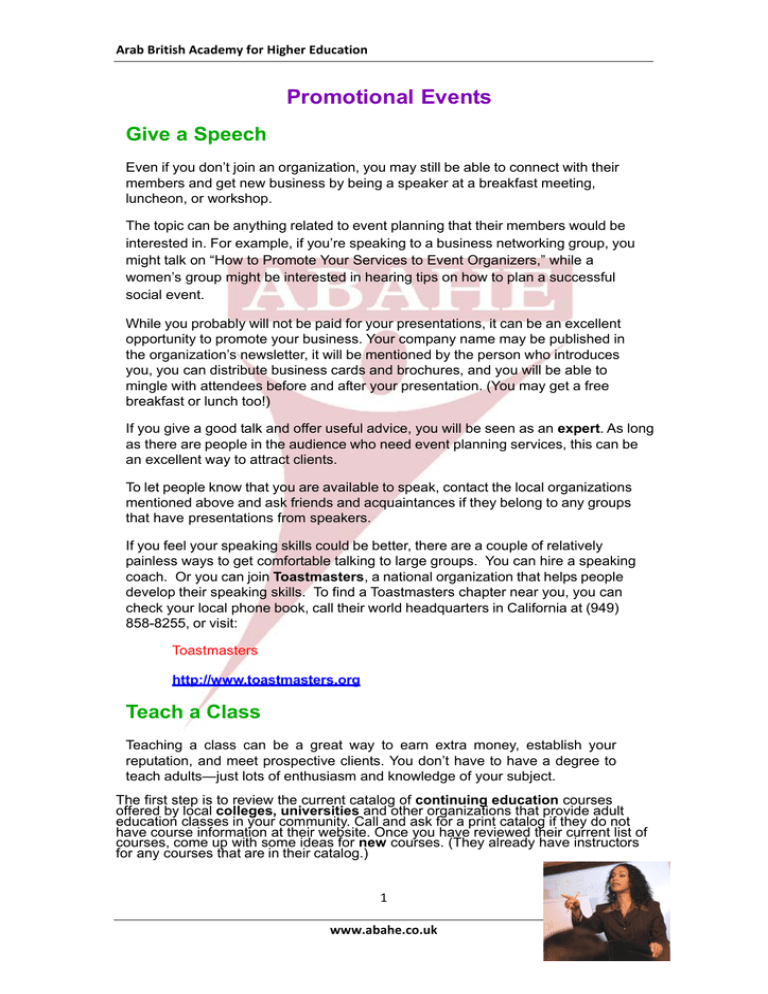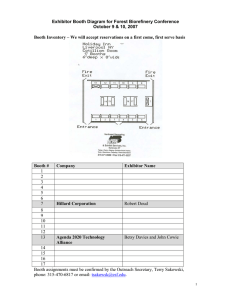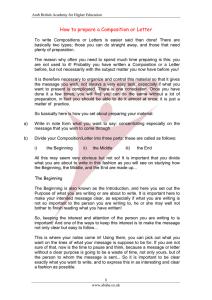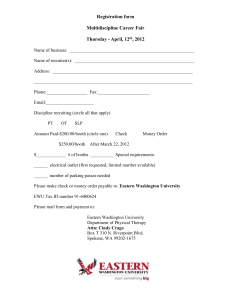
Arab British Academy for Higher Education Promotional Events
Give a Speech
Even if you don’t join an organization, you may still be able to connect with their
members and get new business by being a speaker at a breakfast meeting,
luncheon, or workshop.
The topic can be anything related to event planning that their members would be
interested in. For example, if you’re speaking to a business networking group, you
might talk on “How to Promote Your Services to Event Organizers,” while a
women’s group might be interested in hearing tips on how to plan a successful
social event.
While you probably will not be paid for your presentations, it can be an excellent
opportunity to promote your business. Your company name may be published in
the organization’s newsletter, it will be mentioned by the person who introduces
you, you can distribute business cards and brochures, and you will be able to
mingle with attendees before and after your presentation. (You may get a free
breakfast or lunch too!)
If you give a good talk and offer useful advice, you will be seen as an expert. As long
as there are people in the audience who need event planning services, this can be
an excellent way to attract clients.
To let people know that you are available to speak, contact the local organizations
mentioned above and ask friends and acquaintances if they belong to any groups
that have presentations from speakers.
If you feel your speaking skills could be better, there are a couple of relatively
painless ways to get comfortable talking to large groups. You can hire a speaking
coach. Or you can join Toastmasters, a national organization that helps people
develop their speaking skills. To find a Toastmasters chapter near you, you can
check your local phone book, call their world headquarters in California at (949)
858-8255, or visit:
Toastmasters
http://www.toastmasters.org
Teach a Class
Teaching a class can be a great way to earn extra money, establish your
reputation, and meet prospective clients. You don’t have to have a degree to
teach adults—just lots of enthusiasm and knowledge of your subject.
The first step is to review the current catalog of continuing education courses
offered by local colleges, universities and other organizations that provide adult
education classes in your community. Call and ask for a print catalog if they do not
have course information at their website. Once you have reviewed their current list of
courses, come up with some ideas for new courses. (They already have instructors
for any courses that are in their catalog.)
1 www.abahe.co.uk Arab British Academy for Higher Education Once you have an idea for a new course in mind, call the college or organization
and ask to speak with whoever hires continuing education instructors. They will tell
you what you need to do to apply to teach a course.
Your Own Workshops or Seminars
While teaching continuing education courses can be rewarding, it normally takes
months for a new course to be offered (and there’s always the chance the
continuing education program may decide not to offer it). If you’d like to start
presenting courses right away, consider designing and giving your own workshops
or seminars.
You will need to choose a date and time (evenings are usually best for business
people) and a location, such as a meeting room at a hotel or conference center.
You will then have to decide how much to charge (consider making the fee
comparable to continuing education courses offered in your community), or it may
be free if you are offering it in conjunction with a retailer.
If you are working with a retailer, they will likely market it to their customers.
However, they will expect you to do some marketing yourself, and you will be
responsible for getting registrations yourself if you hold it at another location. The
following is from the
.com Guide to Becoming a Motivational Speaker which gives detailed advice on
how to market a seminar:
When preparing your marketing materials, remember to focus on communicating all
the benefits of attending. As well as the information, benefits of attending a seminar
may include: a fun night out, a chance to network, or personal advice from an expert.
Among the other items you might include in a brochure:
• Who should attend
• When and where the seminar takes place
• The speaker’s credentials
• Testimonials
• That enrollment is limited (mention if past seminars sold out)
• A call to action such as “Register now!”
• How to register, including your phone number and web address
Brochures with this information can also be used to market seminars to the public.
The ideal brochure for a public seminar is one that can double as a poster (e.g.
printed on one side of a colorful 8½” x 11” sheet). If permitted, try posting them at
bulletin boards, especially bookstores and college campuses – two places you’re
likely to find people interested in seminars.
2 www.abahe.co.uk Arab British Academy for Higher Education Trade Shows
If you specialize in social events you may be able to find prospective clients at
public shows and conferences. If you are selling to the corporate market, you might
consider participating in a trade show for a particular industry.
The cost to become an exhibitor (i.e. to get a booth at the show) will vary
depending on the particular show, the location, the number of people expected to
attend, and the amount of space you require. It may range from as little as $50 to
$1,000 or more for public shows, or up to thousands of dollars for trade shows. To
cut costs, you could partner with another non-competing exhibitor and share a
booth space.
However, before investing in a trade show booth, attend the event if possible, or
speak to some past exhibitors. While you may find a $100 booth at a women’s
conference is a good investment to market a party-planning business, $1,000 spent
on a trade show booth to promote meeting planning services could give
disappointing results. (Trade shows are often used to raise awareness rather than
generate immediate sales.)
You can find out about upcoming shows by contacting your local convention
centers, exhibition halls, or chamber of commerce. The following site lets you
search for events by industry, type of event and location. For most events, you can
then click on a link to find out contact information.
Tradeshow Week Directory
http://directory.tradeshowweek.com/directory/index.
asp
Many shows now have their own websites and provide registration information as
well as site maps and logistical information. When setting up your booth you should
bring business cards, your company brochures, and your portfolio for display at
your booth.
When you speak with prospective clients, mention a few of the ideas you have for
creating a spectacular event (but don’t give away too much for free). To arrange
consultations and discuss possible bookings, bring an appointment book or
calendar of events you already have on the books. This information is very
important to know if you are a one-person operation and have already booked
events to plan in the coming months.
TIP: If you don’t have an assistant, find a partner or even a spouse
or close friend to help out at the show. The days can be long and
tiring, and you won’t want to close down your booth to take breaks.
3 www.abahe.co.uk Arab British Academy for Higher Education All Rights Reserved © Arab British Academy for Higher Education 4 www.abahe.co.uk




